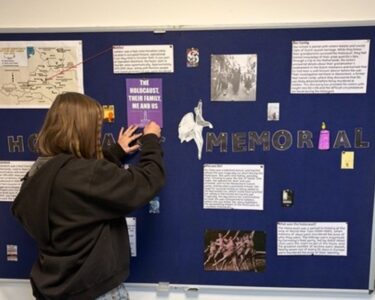The Conference on Jewish Material Claims Against Germany (Claims Conference) recently commissioned Schoen Cooperman Research to conduct a comprehensive national study of Holocaust Knowledge and Awareness in the United Kingdom.
Between the 29th September and 17th October 2021, 2,000 interviews were conducted in the UK with adults aged 18 and over. Professor Stuart Foster and Dr Rebecca Hale from the UCL Centre for Holocaust Education were members of the study taskforce, sharing their expertise in conducting national studies about Holocaust education with students and teachers in England.
The Claims Conference’s UK study identified many important findings and is a valuable contribution to the field as the first UK-wide survey of adults’ knowledge and awareness of the Holocaust. It is the sixth study in a series commissioned by the Claims Conference to examine Holocaust knowledge, awareness and education worldwide, with research in France, Austria, Canada, and the US previously conducted, providing an unprecedented opportunity to explore international trends and variations.
The UK study found numerous misconceptions and knowledge gaps, many of which echoed findings from the Centre’s research with teachers and students. For example, only 15% of adults in the UK knew that in 1941-42 when the British government became aware of the mass murder of Jews, they did not take any action and said they would punish the Nazis after the war. Instead, over a third of respondents said they were not sure about Britain’s response and a fifth incorrectly thought that the government took steps to rescue the Jews. Additionally, two thirds of respondents believed that the government allowed Jewish refugees to immigrate to the UK during the Second World War. This is incorrect. The only rescue operation the British government sanctioned was the Kindertransport programme. This programme enabled unaccompanied Jewish children from Nazi Germany to be admitted into the UK, and took place before the outbreak of the Second World War. Interestingly, despite a high proportion of respondents believing that Jewish refugees came to Britain, only 24% of adults in the UK knew what Kindertransport referred to.
The full report outlines more areas where knowledge is weak. Some observers may ask why we should be concerned that adults in the UK appear to have inconsistent and muddled historical knowledge about the Holocaust? After all, most of them will not be historians or a group that need sound knowledge, such as teachers. It is, of course, entirely defensible that a lay audience would not have detailed historical knowledge of the Holocaust. However, it is also arguable that knowing certain key pieces of information about the Holocaust is important to inform broader understandings and in turn, prevent troubling misconceptions developing. Key pieces of information would include some of the areas covered in the Claims Conference survey, including who the victims of the Holocaust were, who murdered them, the scale of the atrocity and – given this was a survey of the UK – how the British government responded at the time. The example findings outlined above are reflective of cultural and political representations of the Holocaust that proliferate within contemporary British society. In particular, narratives of Britain’s role often reinforce a broadly positive sense of British self-identity. But these framings of the Holocaust as part of our national story may be problematic. It is certainly important to know that Britain was one of the Allied Powers that defeated Nazi Germany, and this defeat brought about the end of the Nazi occupation of Europe and the genocides perpetrated by that regime. But it is also important to understand more clearly how much Britain actually knew about the mass killings of Jews, as well as how both the government and the public responded when this information became available. This awareness allows us to grapple with significant ethical and political questions, including issues of national and international responsibility.
Unfortunately, very troubling trends pertaining to antisemitism and Holocaust denial in the UK were also found in the Claims Conference survey. For example, 9% of respondents believed the Holocaust was a myth or that the number of Jews killed in the Holocaust has been greatly exaggerated. Almost a third of respondents reported seeing Holocaust denial or distortion online. Worryingly, popular social media platforms like Facebook, YouTube and Twitter were the most frequently cited locations for seeing this material. Two thirds of the respondents believed there was currently antisemitism in the UK. In its most recent Antisemitic Incidents Report published in February 2021, the Community Security Trust (CST) reported a general trend of increasing antisemitic incidents since 2013, with 1,668 antisemitic incidences reported to them in 2020 (and of course this doesn’t take into account the cases not reported). More recently, the CST reported that between the 8th May and 7th June 2021, 460 incidents were reported to them – the highest monthly total since records began in 1984. Thus, the findings from the Claims Conference’s UK survey can be viewed as showing reasonably high awareness of antisemitism, while also highlighting a sizeable minority of the British public who are not aware of this abusive and unacceptable behaviour in society.
The Claims Conference survey also explored experiences of, and attitudes towards, Holocaust education. The majority of respondents (83%) agreed that students should learn about the Holocaust while in school and almost three quarters agreed that schools in the United Kingdom should be given more resources from the government to teach students about the Holocaust. However, respondents’ experiences of Holocaust education varied – over a third rated their Holocaust education as good or excellent, but 12% rated it as poor and 17% reported they had never received Holocaust education at school. Clearly, many factors need to be considered here, including that 60% of the respondents were aged 40 years and over, and not in school when the Holocaust became a compulsory element of the key stage 3 history national curriculum in 1991. Moreover, for over a decade, specialist Holocaust education organisations have offered continuing professional development (CPD) courses for teachers to provide powerful and effective teaching and learning, including the programme offered by the UCL Centre for Holocaust Education. Indeed, the Centre’s latest research with teachers provides compelling evidence of a strong relationship between CPD for teachers and secure subject knowledge. This relationship is especially pronounced where such support meets or exceeds the Department for Education’s current Standards for teacher professional development as exemplified by the UCL Centre for Holocaust Education’s flagship Beacon School Programme.
We encourage readers to access Claim Conference’s full report for Holocaust Knowledge and Awareness in the United Kingdom. While it contains some findings to give us hope, including positive attitudes towards Holocaust education and support for government funding for this area of the curriculum, it also contained numerous deeply disturbing findings – in particular, those related to antisemitism, neo-Nazism, Holocaust denial and distortion. The report adds to a growing body of evidence which demonstrates how critical it is for all young people to receive high quality and effective Holocaust education. The UCL Centre for Holocaust Education’s world-leading, research-informed CPD Programme has empowered teachers in England to transform their teaching practice by developing their knowledge and skills in teaching about the Holocaust. In turn, their students not only obtain sound historical knowledge, but they have the opportunity to use this knowledge to powerfully explore its contemporary significance.



